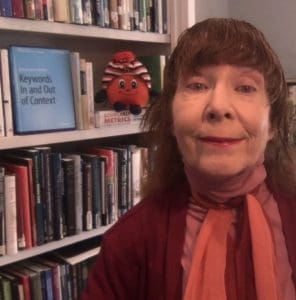 When Dr. Betsy Van der Veer Martens graduated from Syracuse University’s School of Information Studies in 1978 with her master of library and information science degree, “keywords” were emerging as critical in revolutionizing the library search process, she remembers. Now, 45 years later, Martens has written a book on the topic, Keywords In and Out of Context.
When Dr. Betsy Van der Veer Martens graduated from Syracuse University’s School of Information Studies in 1978 with her master of library and information science degree, “keywords” were emerging as critical in revolutionizing the library search process, she remembers. Now, 45 years later, Martens has written a book on the topic, Keywords In and Out of Context.
“The book itself took several years to write, partly because I kept finding fascinating historical data related to various kinds of keywords, such as their use in oral traditions centuries ago, and partly because the technological advances related to keywords today have been accelerating so quickly,” Martens says. “My publisher was very patient with me, I’m happy to say.”
Her book “explores the rich history of the keyword from its earliest manifestations (long before it appeared anywhere in Google Trends or library cataloging textbooks) in order to illustrate its implicit and explicit mediation of human cognition and communication processes,” according to the book’s synopsis.
Keywords are so fascinating, she says, because of their origins and how the words can take on new meaning over the years. “Woke” is one example of a keyword that has transformed in recent years and now has contentious political implications, Martens says. “Yoga” is another example. What began as a religious sense in India is now mostly referenced as a physical fitness movement in the U.S.
“Keywords are important because they can reflect what people at a particular point or place in time are thinking about,” says Martens. “My favorite example of this is ‘radio,’ which shows the career of a specific keyword.”
“Radio” is an abbreviated form of “radio telegraphy” (used in the U.S. as a preferred term to “wireless”), which came into use during the 1920s as a technological term, as enthusiasts began to build their own receivers for listening to early radio transmissions.
During the next three decades, with the growth of the radio broadcasting industry, the term’s connotations became increasingly commercial, with “radio’s” general popularity peaking around 1945, though the term continued its widespread usage through the 1970s, mostly due to the U.S. music industry.
Today, “radio’s” relevance as a keyword is returning to its more technical roots, according to Martens, especially among emergency response specialists and amateur radio operators, since other communication media have largely displaced it in a wider social context.
Martens’ favorite academic keyword at the moment is “semiotics,” the systematic study of sign processes, which is the broadest study of meaning and includes every kind of communicative interpretation, not just keywords.
Her favorite non-academic keyword? “Apple.”
“This is the time of year when I start craving a Cortland or Empire, which are both pretty difficult to find here in Arkansas!” Martens says.
Past, Present and Future of Keywords
Martens didn’t think about writing a book about the past, present, and future of keywords until several years ago, when she realized that the topic might be a perfect fit for the Synthesis Lectures on Information Concepts, Retrieval, and Services series at Springer, a global publisher.
“The purpose of the book is to synthesize different perspectives on the significance of this often-invisible intermediary, both in and out of the library and information science context, and to understand how it has come to be so embedded in our daily life,” she says.
Martens began working with keywords in her first few jobs out of grad school, mostly doing index creation and information retrieval. At the SUNY College of Environmental Science & Forestry, she input keyword abstracts for faculty into the U.S. Department of Agriculture’s Current Research Information System. At the National Enquirer, she retrieved articles on celebrity scandals for editors in the story control department.
“While I certainly got a lot of practical experience with keywords in the publishing world, I didn’t start theorizing about them until I returned to Syracuse in 1995 for my doctorate, where I learned much more about theories of knowledge organization, just as the Internet began to make keywords a critical part of search engine optimization as well,” Martens says.
After graduating with her PhD in information transfer, Martens worked at Cornell University Press and then joined the faculty at the University of Oklahoma School of Library & Information Studies as they broadened their curriculum to focus more on information science. She retired in 2021 after 16 years at OU and was named professor emerita.
Looking ahead, Martens hopes to write more books, “but hopefully ones that won’t require nearly as much research as this one did,” she says. For now, she is enjoying retirement in her new home in Arkansas, working on a few more articles for publication, keeping in touch with her former students, volunteering at the local library, occasionally teaching some classes and exercising.
“Now that I have the time, I’m training for half marathons as well as learning classical piano online. The goal is to be a bit faster in the one and a bit smoother in the other, and the dream is just to enjoy the process as long as I can,” Martens says. “I love being a life-long learner!”
